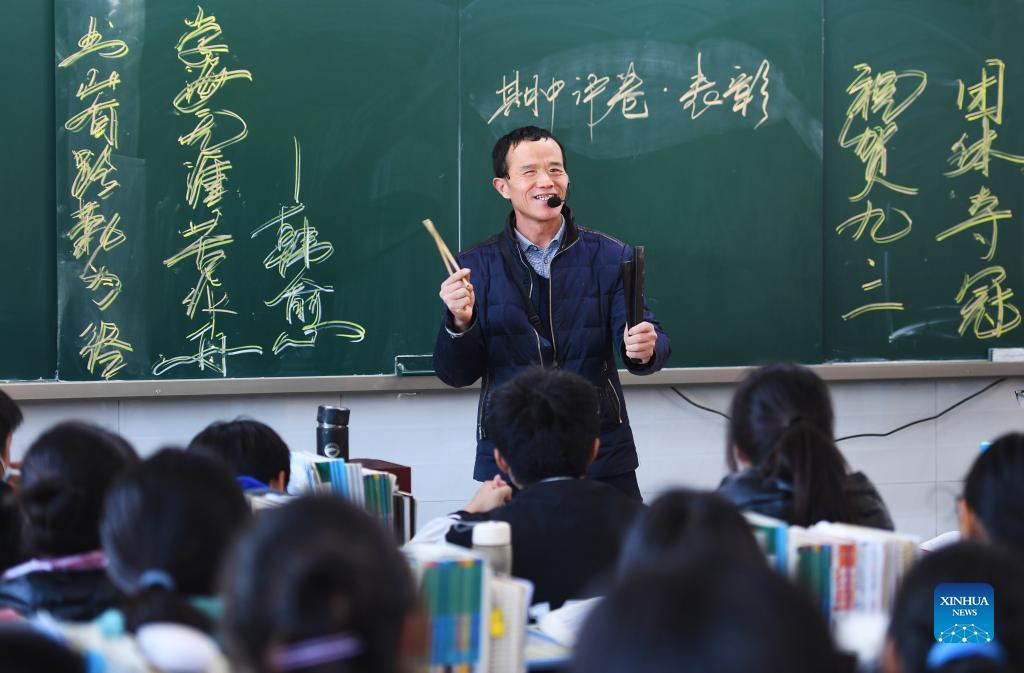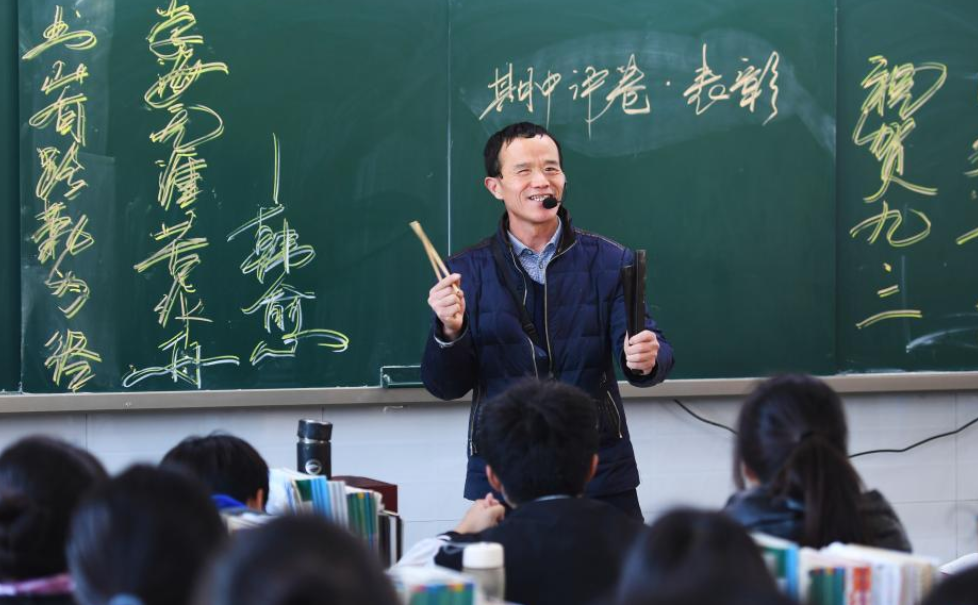Profile: Blind teacher illuminates studies of rural students
Xinhua, March 23, 2022 Adjust font size:
Lu Wenjian narrates stories accompanied by Kuaiban, a bamboo instrument, in his class at school in Shangqiu, central China's Henan Province, Dec. 2, 2021. (Xinhua/Zhang Haoran)
Lu Wenjian typically starts his day with a set rhythm: He wakes up before sunrise and heads to the rural school where he works.
Clutching his cane, he walks along a familiar footpath next to wheat fields. His posture is stooped yet his pace is brisk.
Hours later, students begin to enter the classroom to read, and Lu is already there waiting for them. It's a habit that Lu, 50, has developed over his nearly three decades of teaching.
"Even though my history class isn't on the morning timetable, I also arrive early for it, as I love to hear students read passages aloud from books," said Lu, who is blind.
He is a history teacher at No. 3 Junior High School of Zhanji Town in Shangqiu City, central China's Henan Province.
Born to an impoverished farming family in a village in Zhanji, he became interested in history as a teenager and was later admitted to the Shangqiu teachers' college (now the Shangqiu Normal University) at the age of 19. After graduating, he worked as a teacher in a local school.
New to teaching, he used to stay up late to prepare lessons.
Lu was 23 when he learned he was losing his sight.
"It was in October 1994. After a fever, one day my vision suddenly blurred and I couldn't see clearly," he recalled.
The problem with his eyesight deteriorated and his vision got blurrier. He lost the majority of the vision in his left eye and suffered a detached retina that eventually led to blindness in his right eye.
"At that time, the doctors told me to give up teaching, saying that if I continued overusing my eyes, I might be completely sightless," he said. "The diagnosis and the darkness in front of me seemed to put an end to my career."
However, a well-timed reunion gave him hope. Hearing of his circumstances, Lu's girlfriend Zhang Jiuying rushed to his side to keep him company and lend support. She offered to read his history textbooks aloud to him to help him memorize the information and prepare lessons. They married the next year.
Some of his students visited him in his apartment. They quoted the experience of Zhang Haidi, a female writer, wheelchair-user and chairperson of the China Disabled Persons' Federation, to encourage him to keep working even in the face of adversity, just as he had once counseled them.
"It's hard, but I try to pull myself together for my students," he said.
To help him prepare for his lessons, Lu's wife read out textbook chapters word by word until he was able to repeat them back to her. Some of his students also volunteered to read him books during breaks between classes.
"Given my condition, the school gave me special permission not to write lesson plans in advance, but I had the plans in my mind," he said. "I always sorted out the class design in advance -- the beginning, what stories were cited and how to finish the class."
Through his own efforts and the assistance of those around him, Lu is not only able to learn every word in his textbooks by heart, but is also able to make the classroom his stage. In class, he sings songs composed from stories of historical figures from textbooks, singing to the rhythm of the Kuaiban, a bamboo instrument.
"I had to make my classes lively and interesting so the students would follow me, as I could not observe their reactions with my eyes," he said.
Wang Ziwei, a ninth grader, said Lu's classes are intriguing. "In class, he often narrates stories accompanied by Kuaiban, tells jokes and asks us questions randomly by flipping playing cards, so that everyone has an equal opportunity to participate."
After class, he plays basketball with his students and chats with them. He also practices calligraphy on the blackboard.
He said that more than 4,000 students have read books for him. Among them is Yin Xiaoxiao, a ninth grader who once wrote a letter to him.
"Although you have poor eyesight, you didn't give up teaching. I used to wonder what kind of strength supported you to continue with your teaching career, then you said that source of strength is us," Yin wrote. "My eyes were full of tears and my heart was full of respect. You taught us that we should not give up even when life is cruel."
In March 2021, Lu's wife was diagnosed with colon cancer. Lu has since been shuttling between the hospital and his school. But every time he appears in front of his students, he hides his fatigue and teaches lessons in his usual cheerful manner.
"There is always a way out of any trouble, so it's better to face it positively," Lu said, summing up his philosophy.
Over the years, he has donated more than 30,000 yuan (about 4,714 U.S. dollars) to subsidize students from families with financial difficulties. He also established a "dream award," which ranges from 5 yuan to 100 yuan, to reward students for their progress.
Some of his pupils have been accepted to universities and his classes have won awards of various levels for his teaching quality.
Today, in addition to occasional assistance from students, Lu's class preparations are facilitated by talking software.
"It was my students who helped me when I was in trouble, so I want to return their favor," he said. ■


